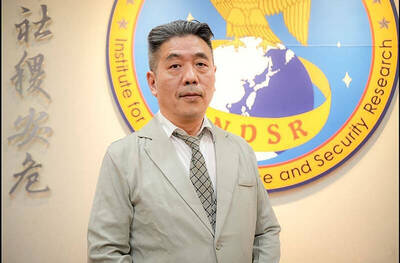The Supreme Court yesterday upheld a not-guilty verdict for Major General Shen Wei-chih (沈威志), who was accused of unlawful imprisonment and disciplining subordinates by illegal means in connection with army corporal Hung Chung-chiu’s (洪仲丘) death in 2013.
The ruling is final and cannot be appealed, and the Judicial Yuan’s Public Functionary Disciplinary Sanction Commission may proceed with Shen’s case unaffected.
Shen was commander of the army’s 542nd Armored Brigade when Hung, a conscript, died from rhabdomyolysis on July 6, 2013, following confinement and physical drills that were reportedly punishment for bringing a camera-equipped cellphone onto a military base.
His death sparked public outrage, leading to a demonstration by 250,000 people in August 2013.
Shen was charged with unlawful imprisonment by a public officer under Article 134 of the Criminal Code and disciplining a subordinate by a method not explicitly authorized by military law under Article 45 of the Criminal Code of the Armed Forces (陸海空軍刑法).
Judges said prosecutors did not provide sufficient evidence to prove that Shen had criminal intent, which is necessary to substantiate the charge of unlawful imprisonment.
The evidence also failed to prove that Shen had prior knowledge that Colonel Ho Chiang-chung (何江忠) and other officers intended to use the disciplinary incident as a pretext to punish Hung in ways that breached military regulations, they said.
Shen signing a disciplinary order and ignoring Hung’s text messages for help was not material to establishing intent, they added.
As court did not have the standing to consider the breach of Article 45, because the law specifically forbids cases involving Article 45 to go to a third trial, the court upheld the Taiwan High Court’s not-guilty ruling on both counts, the judges said.

Taipei and Kaohsiung have extended an open invitation to Japanese pop star Ayumi Hamasaki after Chinese authorities abruptly canceled her scheduled concert in Shanghai. Hamasaki, 47, had been slated to perform on Saturday before organizers pulled the show at the last minute, citing “force majeure,” a move widely viewed as retaliation for Japanese Prime Minister Sanae Takaichi’s recent remark that a Chinese attack on Taiwan could draw a military response from Tokyo. Taipei Mayor Chiang Wan-an (蔣萬安) yesterday said the city “very much welcomes” Hamasaki’s return and would continue to “surprise” her. Hamasaki, who has a large global fan base, including

Starting next month, people who signed up for the TPass 2.0 program can receive a 15 percent rebate for trips on mid to long-distance freeway buses or on buses headed to the east coast twice every month, the Highway Bureau said. Bureau Director-General Lin Fu-shan (林福山) said the government started TPass 2.0 to offer rebates to frequent riders of public transportation, or people who use city buses, highway buses, trains or MRTs at least 11 times per month. As of Nov. 12, 265,000 people have registered for TPass 2.0, and about 16.56 million trips between February and September qualified for

The year 2027 is regarded as the year China would likely gain the capability to invade Taiwan, not the year it would launch an invasion, Taiwanese defense experts said yesterday. The experts made the remarks after President William Lai (賴清德) told a news conference on Wednesday that his administration would introduce a NT$1.25 trillion (US$39.8 billion) special defense budget bill to boost Taiwan’s overall defense posture over the next eight years. Lai said that Beijing aims for military unification of Taiwan by 2027. The Presidential Office later clarified that what Lai meant was that China’s goal is to “prepare for military unification

HOW RUDE: Joe Biden’s Indo-Pacific defense chief condemned China’s response to Takaichi’s remarks as inappropriate and heavy-handed, while praising Japan’s nerve A former US defense official under former US president Joe Biden has voiced support for Japanese Prime Minister Sanae Takaichi for her remarks suggesting that Japan could help defend Taiwan, while describing Beijing’s response as “inappropriate.” Ely Ratner, who served as assistant secretary of defense for Indo-Pacific security affairs from 2021 to this year, said in a CNA interview that Takaichi’s comments on Taiwan simply reflected Japan’s position and stance on Taiwan. On Nov. 7, the Japanese prime minister commented in a parliamentary session that a Chinese attack on Taiwan could constitute “a situation threatening Japan’s survival” that could trigger a military